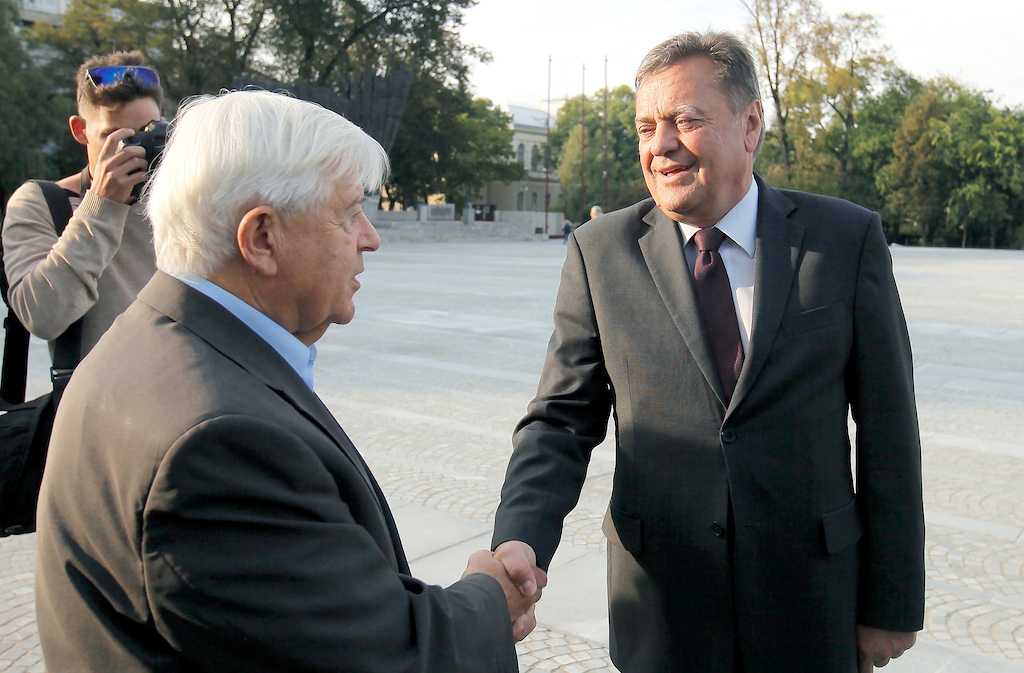By: G. B.
Everyone has the right to their own personal opinions, said Prime Minister Robert Golob today in response to a journalist’s question regarding a letter from Ljubljana Mayor Zoran Janković, in which he expressed support for Serbian President Aleksandar Vučić amid the protests in Serbia. Upon arriving at the EU summit in Brussels, Golob stated that he does not wish to comment on Serbia’s internal political situation.
President of the Republic Nataša Pirc Musar recently gave a similar response to the same question. Like Prime Minister Golob, before the start of an informal meeting in Brussels where EU leaders will discuss the future of European defence, she declined to comment on the situation in Serbia. She emphasised that she does not wish to interfere in the internal affairs of other countries. Regarding the expulsion of a Slovenian citizen who participated in an NGO event in Belgrade at the end of January, Golob added that there has been no contact with Serbian authorities on the matter.
Last week, the Slovenian Ministry of Foreign Affairs responded to Janković’s letter of support, clarifying that his position does not represent Slovenia’s official stance. Criticism of Janković also surfaced through separate petitions – one signed by a group of 100 prominent public figures from Ljubljana and another initiated by former MEP Klemen Grošelj. President of the National Assembly Urška Klakočar Zupančič voiced her respect and support for the Serbian protesters in a Facebook post on Sunday. “They are not demanding elections or resignations, and they have distanced themselves from the opposition and NGOs. They are simply urging the president to operate within constitutional limits. Their four demands must be met by the appropriate institutions. They seek a lawful state free of corruption,” she wrote.
Former Slovenian President Milan Kučan also criticised Janković’s letter in a statement released to the Slovenian Press Agency (STA) today. He asserted that the Ljubljana mayor’s support for Vučić lacks backing among Ljubljana residents. “He does not have my support either. His move was a political mistake,” Kučan stated, adding that the student protests, which have triggered essential democratisation processes in Serbia, deserve support. He reminded that the protesters are calling for “a normal democratic Serbia free of corruption and clientelism” and a rule-of-law system in which “a single person – the president – cannot act as an absolute autocrat, speaking and taking action on behalf of all institutions beyond his mandate.” In Kučan’s view, meeting the protesters’ demands would facilitate Serbia’s path toward European integration.
Former President Borut Pahor also weighed in, stating that the situation in Serbia goes beyond ordinary protests and will lead to lasting changes in the country. “Vučić’s power has been shown to be limited. Ultimately, he had to sacrifice the prime minister. Yet, the protests have not subsided,” Pahor told Primorske novice. He noted that Vučić’s government has taken restrictive measures at the border, signalling hostility toward other nations in the region. “Let’s not forget Vučić’s past statements about Slovenia. Such behaviour should not surprise us, but we should not remain silent either. We must signal that we are observing their actions and protest if necessary. After all, this concerns our citizens,” Pahor added. However, he also pointed out that there is no viable political alternative to Vučić in Serbia should the protests lead to his removal.
The SD party also expressed support for the Serbian protesters today. “Serbian students have taken to the streets in the name of justice, democracy, and a better future. Their fight for freedom of speech, equal opportunities, and a transparent society deserves our full support,” the party stated. SD emphasised its solidarity with the protesters’ efforts to democratise their country. “We assure them that they are not alone in their struggle. We share their demands, raise awareness, and stand by their side in their pursuit of positive change in Serbia,” the statement read.
The mass protests in Serbia began in November following the collapse of a shelter at the Novi Sad railway station, which resulted in 15 deaths. Protesters blame the tragedy on corruption and a lack of transparency in the years-long renovation project. Their demands include government accountability, adherence to constitutional and legal principles, and the eradication of corruption. Over the past three months, hundreds of thousands of people across more than 130 cities have gathered to honour the victims of the disaster. The largest protests took place in Belgrade on December 22nd and January 27th, with estimates suggesting that more than 200,000 people participated over the two days.
Kučan’s position, therefore, stands in stark contrast to Janković’s and Golob’s, with Golob seemingly unwilling to alienate Janković. It is worth noting that Kučan has long been an advocate of refined political governance that adheres to formal legal norms. He places significant value on institutions such as the judiciary and prefers collective governance over the authority of a single individual, having himself been accustomed to ruling from behind the scenes.
